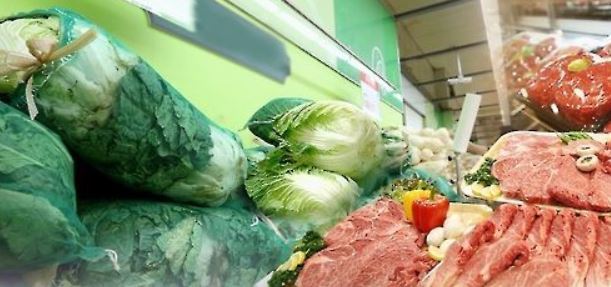South Korea's consumer prices rose at the slowest pace in 10 months in October as high-flying food prices slowed down, government data showed Wednesday.
The consumer price index advanced 1.8 percent last month from a year earlier, down 0.3 percentage point from a month earlier, according to the data compiled by Statistics Korea.
It is the lowest figure since December last year when it posted 1.3 percent. Also, the October number returned to below the 2 percent level for the first time since June.
Core inflation, which excludes volatile oil and food prices, also increased 1.6 percent on-year.
The statistics office said an increase in the supply of farm products helped slow down inflation last month.
Prices of fresh agricultural and marine products rose 3 percent on-year in October, with those of vegetables falling 9.7 percent on-year in the same period.
The consumer price index advanced 1.8 percent last month from a year earlier, down 0.3 percentage point from a month earlier, according to the data compiled by Statistics Korea.
It is the lowest figure since December last year when it posted 1.3 percent. Also, the October number returned to below the 2 percent level for the first time since June.
Core inflation, which excludes volatile oil and food prices, also increased 1.6 percent on-year.
The statistics office said an increase in the supply of farm products helped slow down inflation last month.
Prices of fresh agricultural and marine products rose 3 percent on-year in October, with those of vegetables falling 9.7 percent on-year in the same period.

In particular, prices of cabbage plunged 36.8 percent and those of pumpkin declined 27.4 percent in October.
Since the beginning of the year, shipments of fresh vegetables and fruits were affected by bad weather. Prices of meat and eggs also went up as South Korea had to deal with animal epidemics like avian influenza.
Due to problems in the food supply, the price index hovered around 2 percent throughout 2017 and peaked at 2.6 percent in August, compared with a 0.7 percent gain in 2015 and a 1 percent rise in 2016.
Moreover, utility bills backtracked 1.6 percent from a year ago on the back of the government-led tariff cut started in December last year.
"This year's inflation was largely led by a food prices hike stemming from a supply shortage," said Kim Yun-sung, director of the price statistics division at the statistical bureau. "We will watch the movement of inflation numbers as we go into the winter season."
The government will make more efforts to stabilize the cost of major ingredients and vegetables for the kimchi-making period, or "gimjang," which usually starts in November.
"The government will keep close tabs on prices of vegetables like dried peppers and garlic," the finance ministry said. "We will additionally check gas prices at the pumps as crude oil prices have been on an upside cycle." (Yonhap)








![[Graphic News] More Koreans say they plan long-distance trips this year](http://res.heraldm.com/phpwas/restmb_idxmake.php?idx=644&simg=/content/image/2024/04/17/20240417050828_0.gif&u=)
![[KH Explains] Hyundai's full hybrid edge to pay off amid slow transition to pure EVs](http://res.heraldm.com/phpwas/restmb_idxmake.php?idx=644&simg=/content/image/2024/04/18/20240418050645_0.jpg&u=20240419100350)






![[From the Scene] Monks, Buddhists hail return of remains of Buddhas](http://res.heraldm.com/phpwas/restmb_idxmake.php?idx=652&simg=/content/image/2024/04/19/20240419050617_0.jpg&u=20240419175937)

![[KH Explains] Hyundai's full hybrid edge to pay off amid slow transition to pure EVs](http://res.heraldm.com/phpwas/restmb_idxmake.php?idx=652&simg=/content/image/2024/04/18/20240418050645_0.jpg&u=20240419100350)

![[Today’s K-pop] Illit drops debut single remix](http://res.heraldm.com/phpwas/restmb_idxmake.php?idx=642&simg=/content/image/2024/04/19/20240419050612_0.jpg&u=)